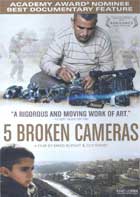
5 Broken Cameras 2011
Distributed by Kino Lorber Edu, 333 West 39 St, Suite 503, New York, NY 10018; 212-629-6880
Produced by Guy Davidi, Emad Burnat, Serge Gordey, Christine Camdessus
Directed by Emad Burnat and Guy Davidi
DVD, 95 min.
College - General Adult
Arab-Israeli Conflict, Human Rights
Date Entered: 09/05/2013
Reviewed by Brian Falato, University of South Florida Tampa Campus LibraryFive Broken Cameras is both home movie and testimony on life in the Israeli-occupied West Bank region. From the time that Palestinian farmer Emad Burnat first acquired a video camera, the two have been intertwined. His fourth son’s birth coincided with the clearing of land owned by Palestinians to make room for more Israeli settlements. Documenting both his son’s first five years and the continuing Palestinian resistance to the Israeli presence, Burnat’s footage proves that the personal is political and the political is personal.
Burnat worked with Israeli filmmaker Guy Davidi to turn the raw footage into the film we see. In accompanying interviews on the DVD, the two men talk about their collaboration. Davidi said he brought an outsider’s viewpoint to Burnat’s intensely personal experiences, while Burnat’s matter-of-fact reading of the narration (in Arabic with subtitles) offset Davidi’s tendencies to be more emotional and poetic in the text Davidi wrote. Burnat said some of his neighbors wondered why he was working with an Israeli filmmaker, but explained that he trusted Davidi and felt he could still get his points across. Davidi opposes Israeli militarism and is clearly sympathetic to the Palestinians.
The five broken cameras of the film’s title were five cameras used by Burnat that were damaged during filming. The first camera was hit by a gas grenade, while the second was broken by an Israeli soldier. Gunfire hit two more cameras, and the other was broken when Burnat was seriously injured in a truck accident.
Burnat kept on filming despite all the setbacks. He explains in the narration that his camerawork has value in documenting what occurred, but the act of filming also helps him “confront life and survive.” It also provides a kind of healing.
Burnat’s footage of the protests and Israeli reactions is certainly dramatic. The footage probably will dispose viewers toward support for the Palestinians and against the Israeli military. The other side’s point of view is nowhere presented in this documentary, so it’s certainly true that you won’t get the whole story of the Israeli-Palestinian conflict. But viewed as a kind of personal testimony, the documentary has value and is recommended. And there may be more to come. Burnat continues to film his life and that of his village, now using his sixth camera.